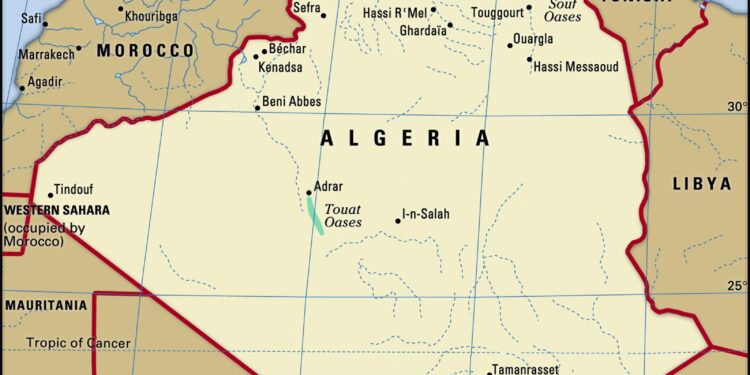Algeria’s Expulsion of French Diplomats: A Turning Point in Bilateral Relations
The recent directive by the Algerian government to expel multiple French diplomats has intensified diplomatic strains between the two countries, casting a shadow over their historically intricate relationship. This development emerges amid unresolved historical grievances and ongoing political disagreements that continue to challenge Franco-Algerian ties. As both nations assess the repercussions, experts are evaluating how this rupture might affect not only diplomatic channels but also economic cooperation and regional security dynamics. This episode represents a pivotal moment, raising critical questions about the trajectory of future collaboration and dialogue.
Escalating Diplomatic Strains Following Algeria’s Expulsions
Algeria’s decision to declare several French officials persona non grata signals a marked shift in its foreign policy posture towards France. The expulsions were justified by accusations of undue interference in Algeria’s domestic affairs, an allegation that underscores deepening mistrust between Paris and Algiers. This assertive move has drawn significant attention from European capitals and global diplomatic observers alike, highlighting Algeria’s growing confidence on the international stage.
France is now compelled to reconsider its diplomatic approach as this incident reflects entrenched tensions rooted in colonial history alongside contemporary disputes over regional security concerns. The aftermath could reshape various facets of bilateral engagement including trade relations, military partnerships, and cultural interactions.
- Historical Legacy: Persistent bitterness stemming from France’s colonial rule over Algeria continues to influence current relations.
- Shifting Alliances: Algeria may pursue stronger connections with alternative global partners as a counterweight to French influence.
- Eroding Trust: Cooperation on counterterrorism efforts faces uncertainty amid rising diplomatic discord.
The Underlying Causes Fueling Franco-Algerian Discord
The roots of tension between Algeria and France extend beyond immediate political disputes into deep historical wounds left by more than a century of colonization—over 130 years under French rule—that have yet to fully heal. These scars manifest not only through collective memory but also through ongoing debates about identity and sovereignty within Algerian society.
Apart from history, contemporary issues such as migration policies exacerbate friction; Algerian authorities frequently criticize France for its treatment of Algerian immigrants and diaspora communities residing there. Furthermore, geopolitical ambitions complicate matters further: Algeria strives for greater autonomy regarding resource management—particularly energy—and regional conflict stances that often diverge sharply from those favored by France.
- Backing Opposition Movements: Support for certain political factions in neighboring states adds layers of complexity to bilateral ties.
- Energizing Economic Rivalries: Disputes surrounding trade agreements and control over natural resources remain contentious points.
- Cultural Identity Debates: Ongoing discussions around language policies reflect broader societal challenges within Algeria itself.
A recent survey conducted by the International Crisis Group (2024) indicates that nearly 65% of Algerians view their country’s relationship with France as “strained” or “deteriorating,” underscoring widespread public sentiment aligned with official government positions on these issues.
Tactical Approaches Toward Reconciliation & Renewed Partnership
Navigating out of this impasse requires deliberate efforts centered on dialogue grounded in respect for sovereignty while acknowledging shared interests. High-level negotiations emphasizing transparent communication can pave pathways toward resolving misunderstandings before they escalate further. Establishing dedicated conflict resolution committees, comprising representatives from both sides could facilitate continuous engagement focused on addressing core grievances constructively rather than reactively responding to crises alone.
Cultural diplomacy initiatives offer another avenue for rebuilding trust — programs promoting artistic collaborations or educational exchanges can foster mutual appreciation beyond politics.This strategy mirrors successful models seen recently between Spain-Morocco cultural forums which helped ease longstanding tensions through people-to-people contact.*
- Cultural Exchange Programs: Organizing joint exhibitions showcasing heritage arts strengthens interpersonal bonds across borders;
- Bilateral Business Forums: Conferences aimed at boosting investment opportunities encourage economic interdependence;
- Youth & Academic Mobility Schemes: Scholarship exchanges promote long-term understanding among emerging leaders;
Pursuing these combined strategies may gradually restore confidence while mitigating risks associated with escalating hostilities — ultimately fostering an environment conducive to sustainable cooperation across multiple sectors including security collaboration against terrorism threats prevalent throughout North Africa today (UNODC report, March ’24).
A Forward Look: Implications Beyond Bilateral Ties
The expulsion episode is emblematic not just of bilateral discord but also reflects shifting geopolitical currents affecting North Africa broadly. With increasing competition among global powers vying for influence—from China investing heavily into African infrastructure projects exceeding $60 billion annually (World Bank data)—Algeria’s recalibration away from traditional Western partners like France signals evolving alliances shaping future regional stability.
This situation demands close observation since outcomes will likely reverberate beyond Franco-Algerian relations alone impacting Mediterranean security frameworks, Middle Eastern diplomacy trends,and broader international power balances moving forward.
Conclusion: Navigating Complex Legacies Toward Constructive Engagements
The recent expulsions mark a critical inflection point underscoring unresolved historical wounds intertwined with present-day strategic disagreements between Algeria and France. While challenges loom large—with potential disruptions spanning diplomacy, economics,and security—the path ahead lies through sustained dialogue coupled with pragmatic cooperation initiatives designed around mutual respect.
If successfully managed via inclusive platforms prioritizing transparency alongside cultural understanding,the two nations can rebuild fractured trust paving way toward renewed partnership beneficial not only bilaterally but regionally amidst an increasingly complex geopolitical landscape.















